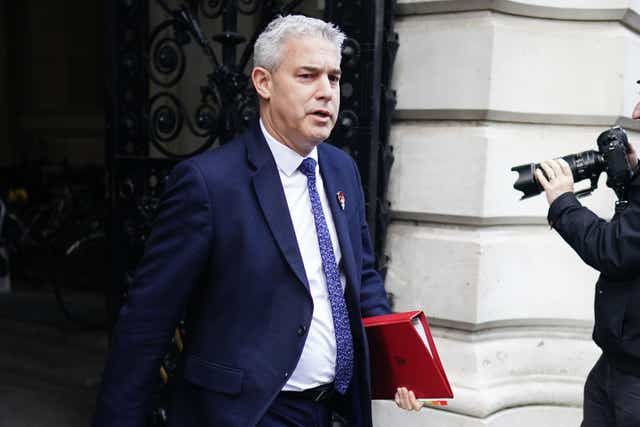
Nurses vote to strike nationwide with London hospitals affected
Nursing staff at the majority of NHS employers across the UK have voted to take strike action over pay for the first time in history, the Royal College of Nursing has announced, with industrial action set to affect several hospitals in London.
Strike action will take place across 12 NHS employers in the capital, the union confirmed on Wednesday, sparking fears that patients could face disruption to operations and appointments.
Hospitals set to be affected in the capital include Guys and St Thomas, Great Ormond Street Hospital, the Royal Marsden and Kings College Hospital.
It follows a protracted row between the RCN and The Department of Health and Social Care (DHSC) over pay, with the union demanding a pay rise of 5 per cent above inflation to shield staff from a huge rise in energy bills and rent hikes. The RCN have claimed that the Government’s offer of £1,400 is insufficient to cope with the cost of living crisis.
RCN General Secretary and Chief Executive Pat Cullen said: “Anger has become action – our members are saying enough is enough. The voice of nursing in the UK is strong and I will make sure it is heard. Our members will no longer tolerate a financial knife-edge at home and a raw deal at work.
“Ministers must look in the mirror and ask how long they will put nursing staff through this. While we plan our strike action, next week’s Budget is the UK government’s opportunity to signal a new direction with serious investment. Across the country, politicians have the power to stop this now and at any point.
“This action will be as much for patients as it is for nurses. Standards are falling too low and we have strong public backing for our campaign to raise them. This winter, we are asking the public to show nursing staff you are with us.”
Strike action will not impact emergency services and intensive care units will remain fully staffed, the RCN has said. However, industrial action is likely to affect routine services such as knee and hip replacements or mental health care.
Industrial action is expected to begin before the end of this year and the RCN’s mandate to organise strikes runs until early May 2023, six months after members finished voting.
The RCN did not disclose how many of its 300,000 members had voted.
Health Secretary Steve Barclay said he “deeply regretted” that nurses were taking strike action and that the NHS had plans in place to minimise disruption to services.
In a series of tweets, he claimed that the RCN’s demands “aren’t reasonable or affordable”, adding: “Regrettably, this action will mean some patients will have their treatment delayed.”
Wes Streeting, shadow health secretary, said: “There were no strikes in the NHS during 13 years when Labour was last in government. If we were in office today, we would be talking with the RCN and doing everything we can to prevent these strikes going ahead.
“Government ministers spent the summer dodging calls and requests for meetings from the Royal College of Nursing. It is unacceptable negligence.
“The Conservatives have stopped governing and it is nurses and patients who will be made to pay the price.”

Health Secretary Steve Barclay said that trade union demands were not ‘reasonable or affordable’
Health and Social Care Secretary Steve Barclay said: “We are all hugely grateful for the hard work and dedication of NHS staff, including nurses, and deeply regret that some union members have voted for industrial action.
“These are challenging times, which is why we accepted the recommendations of the independent NHS Pay Review Body in full and have given over one million NHS workers a pay rise of at least £1,400 this year. This is on top of a 3 per cent pay increase last year when public sector pay was frozen and wider government support with the cost of living.
“Our priority is keeping patients safe during any strikes. The NHS has tried and tested plans in place to minimise disruption and ensure emergency services continue to operate.”
Matthew Taylor, chief executive of the NHS Confederation, said that the RCN’s members “will not have taken the decision lightly”.
“We hope that the negotiating parties can reach a compromise that will both minimise disruption to patient care and benefit frontline staff. The last thing anyone wants is a ‘war of attrition’ playing out over many months,” he said.
“Health leaders are now focused on understanding the specific implications of industrial action in their services and putting in place to ensure that as a minimum, urgent, emergency and critical care services can continue on any strike days.
“If any changes need to be made to non-urgent care services, such as check-ups and elective care, they will ensure this is communicated in advance to patients.”
Dr Emma Runswick, deputy chairwoman of the BMA (British Medical Association) council said: “Doctors offer our support and solidarity to nursing colleagues following this historic ballot for industrial action.
“Like us, nurses are showing that they have had enough of being undervalued by this Government.
“Along with other frontline healthcare workers, nurses have borne the brunt of an understaffed and under-resourced health service, where despite their best efforts and working at their absolute limits, healthcare staff are too often unable to provide patients with the care they need.”











